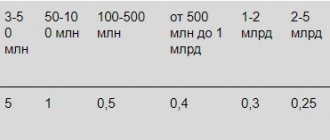Responsibility of suppliers under 44-FZ
If the contractor (contractor, supplier) has violated the terms of the contract, the customer may send him a demand for payment of a penalty (penalty, fine). Law 44-FZ divides violations into two main types:
- Improper fulfillment of obligations , for which the customer has the right to demand a fine.
- Delay in fulfilling a contract , for which penalties are charged.
What has changed in the field of procurement under 44-FZ and 223-FZ during the pandemic, read more in the topic “Changes to 44-FZ and 223-FZ due to the coronavirus pandemic.”
Inadequate performance is a result (goods delivered or service provided) that does not meet the stated requirements. For example, the strength of metal structures differs from the permissible values specified in the contract.
Registration in the ERUZ UIS
From January 1 2020 , in order to participate in bidding under 44-FZ, 223-FZ and 615-PP, registration in the ERUZ register (Unified Register of Procurement Participants) on the EIS (Unified Information System) portal in the field of procurement zakupki.gov is .ru.We provide a service for registration in the ERUZ in the EIS:
Order registration in the EIS
Delay - when the contractor did not meet the deadlines specified in the government contract.
In connection with failure to fulfill obligations within the terms specified in the contract, the customer has the right to apply to the arbitration court with a request to terminate the contract. Read more in the topic “Termination of a contract under 44-FZ”.
Calculation of fines under 44-FZ
The system for calculating fines is regulated by Decree of the Government of the Russian Federation dated August 30, 2017 No. 1042. The specific percentage of the fine is selected depending on the final amount of the contract or the price for its individual stage, and not on the initial maximum amount.
| Contract amount, rub. | below 3 million | 3-50 million | 50-100 million | 100-500 million | 500 million to - 1 billion | 1-2 billion | 2-5 billion | 5-10 billion | 10 billion and above |
| Fine, % | 10 | 5 | 1 | 0,5 | 0,4 | 0,3 | 0,25 | 0,2 | 0,1 |
Attention! The amount of all accrued fines for non-fulfillment or improper fulfillment of obligations by a participant under a contract should not exceed the price of this contract.
Fines for SMP and SONKO
The situation of medium and small businesses (SMEs) and socially oriented non-profit organizations (SONCOs) is somewhat easier. For such suppliers, penalty rates are much lower - 1% of the contract amount (price of its stage), however, not lower than 1000 rubles. and no more than 5000 rubles.
Fines for violations of obligations without monetary expression
Some obligations do not have a value expression. Violation of them also results in a fine. This could be, for example, a delay in delivery of goods, defective goods, lack of accompanying documents for delivered goods, etc.
| NMCC, rub. | Less than 3 million | 3-50 million | 50-100 million | 100 million and above |
| Fine, rub. | 1 000 | 5 000 | 10 000 | 100 000 |
Attention! The customer is obliged to indicate such obligations, as well as penalties for violating them, in the draft contract. Otherwise, the customer will be fined for incorrectly completed documentation.
Calculation of penalties according to 44-FZ
The scheme for calculating penalties is prescribed in Part 7 of Article 34 of Law No. 44-FZ. Penalties are calculated as 1/300 of the key rate of the Central Bank of the Russian Federation from the contract amount and the duration of the delay, that is:
Penalty = Contract amount × (1/300 × Key rate) × number of days overdue
When part of the work under the contract has already been successfully completed, this should be taken into account when calculating the penalty: the contract amount is reduced by the amount of work done.
Attention! Penalties are not charged for the days it took the client to accept the goods (established by letter of the Ministry of Finance dated November 7, 2017 No. 24-03-08/73293).
When calculating penalties, you should proceed from the key rate set by the Central Bank of the Russian Federation - 1/300. Even if both participants agreed to change it, this should under no circumstances be done (as decided by the Arbitration Court of the Central District on March 26, 2015 in case No. A64-3838/2014).
Fines and penalties for customers under 44-FZ, all fines are indicated in rubles, the amount varies depending on the contract amount:
| Contract amount, rub. | Less than 3 million rubles. | 3-50 million rubles. | 50-100 million rubles. | 100 million rub. and higher |
| Fine, rub. | 1 000 | 5 000 | 10 00 | 100 000 |
Attention! For customers, the same procedure for calculating penalties applies as for performers.
Changes in procurement legislation under 44-FZ in the context of the COVID-19 pandemic
13.04.2020
Estimated reading time: 10 min.
Elena Sokolovskaya
Legal reports on measures taken to change procurement legislation.
In the context of a difficult epidemiological situation caused by the spread of a new coronavirus infection, government authorities are taking measures to amend the Federal Law of 04/05/2013 N 44-FZ “On the contract system in the field of procurement of goods, works, services to meet state and municipal needs” (Further) – “Law No. 44-FZ”).
Simplification of procurement procedures in the event of force majeure and emergency situations
The Federal Antimonopoly Service, in its letter dated March 18, 2020 No. IA/21684/20, recognized the coronavirus pandemic as a force majeure circumstance (force majeure).
, which must be taken into account when considering complaints, cases of administrative offenses, requests for inclusion in the register of unscrupulous suppliers, and conducting inspections.
In addition, the letter states that, on the basis of clause 9, part 1, art. 93 of Law No. 44-FZ, customers have the right to purchase from a single supplier (contractor, performer), subject to a cause-and-effect relationship
between actions to prevent, prevent, and eliminate the consequences of the spread of coronavirus infection and the subject of procurement.
On March 19, 2021, the Ministry of Finance published letter N 24-06-06/21324 “On procurement from a single supplier (contractor, performer) during the introduction of a high-alert regime,” in which the Ministry of Finance of Russia also:
- comes to the conclusion that the spread of the new coronavirus infection is extraordinary and unpreventable, and therefore constitutes a force majeure event;
- confirms the right to purchase from a single supplier;
- indicates that the condition on the absence of purchased goods, works, services in the list of goods, works, services necessary to provide humanitarian assistance or eliminate the consequences of an emergency situation does not apply[1].
More detailed explanations are contained in Federal Law
No. 98-FZ dated 01.04.2020, , “On Amendments to Certain Legislative Acts of the Russian Federation on the Prevention and Elimination of Emergency Situations”
(hereinafter referred to as “Federal Law No. 98-FZ”), which resolves relations arising in connection with the need for an emergency response to challenges associated with the spread of the new coronavirus infection. The bill provides for the following changes in relation to the procurement procedure:
- pre-selection, which was an exception for the procurement commission to verify the compliance of procurement participants with certain provisions of the law, is no longer such an exception;
- The rules on the procedure for submitting applications for participation in the preliminary selection of procurement participants for the purpose of providing humanitarian assistance or eliminating the consequences of natural or man-made emergencies are no longer valid[2].
| The pre-selection procedure has shown to be ineffective for procurement in emergency situations, and therefore it was decided to abandon it in the current conditions. |
- procurement from a single supplier has also become possible for prevention (i.e., when introducing a high alert regime) and (or) liquidation of an emergency situation, for the provision of humanitarian assistance;
- at the same time, the customer has the right to purchase goods, work, services in the required quantity and volume, if the use of competitive time-consuming methods for determining a supplier is impractical;
- allows federal executive authorities to enter into contracts with a single supplier in order to perform special tasks to ensure the defense and security of the state;
- until December 31, 2020, the government was allowed to use the grounds for purchasing from a single supplier, which are not in 44-FZ.
In addition, the final provisions of Law No. 44-FZ have significantly simplified the conduct of “special” procurement in the construction sector:
- the condition that this norm applies only to procurement in relation to capital construction projects implemented within the framework of national projects has been excluded;
- The right to approve lists of capital construction projects that can be purchased on a turnkey basis is vested not only in the Government of the Russian Federation and the highest executive bodies of state power of the constituent entities of the Russian Federation, but also in local administrations;
- it was established that such lists must be approved before January 1, 2024;
- It has been determined that within the framework of turnkey procurement, it is possible to purchase any equipment provided for in the project documentation necessary to ensure the operation of the facility, and not just medical equipment, as was previously established.
In the consistent implementation of state policy aimed at changing the regulation of procurement procedures in the context of a pandemic, on March 25, 2021, the Ministry of Finance of Russia began preparing a draft federal law
“On amendments to the Federal Law “On the contract system in the field of procurement of goods, works, services for the provision of public and municipal needs"
(hereinafter referred to as the "Ministry of Finance Project"), which is also aimed at optimizing the procurement procedure from a single supplier in order to eliminate the consequences of force majeure and emergency situations[3].
The project was developed in accordance with clause 4.4. Plan of priority measures (actions) to ensure sustainable economic development in the context of a worsening situation due to the spread of a new coronavirus infection. The planned date for the entry into force of the draft regulatory legal act is set in June.
| The adopted amendments to 44-FZ are intended to support business in the context of the spread of COVID-19 as force majeure circumstances. Simplifying the procurement procedure will allow customers to quickly obtain the required resources, including medicines, personal protective equipment, disinfectants, etc. |
Relaxation of requirements for small and medium-sized businesses
When making purchases from small businesses and socially-oriented non-profit organizations, Federal Law No. 98-FZ provides for the provision that until December 31, 2020, customers have the right not to require these entities to ensure the fulfillment of contracts and warranty obligations
(provided there is no advance payment).
The draft of the Ministry of Finance being developed is planned to include, among other things, changes relating to granting the customer the right not to establish a requirement to secure a contract when purchasing from small businesses.
In addition, the draft government guidelines
,
prepared by the Ministry of Finance
(hereinafter referred to as the “Draft Directives”) also contains the following provisions:
- state-owned companies will introduce into their procurement regulations a provision on the possibility of making advances of up to 50% of the contract price with 30% of purchases from small and medium-sized businesses;
- state-owned companies must decide to strengthen control over compliance with payment deadlines under contracts with small and medium-sized businesses;
- State-owned companies must ensure that relevant decisions (on advance payments and on strengthening control) are extended to their subsidiaries and affiliates[4].
These measures are aimed at supporting business entities, including to prevent the onset of negative consequences due to the spread of the new coronavirus infection.
Expansion of possibilities for changing the contract term and price
Federal Law No. 98-FZ in 2021 allows changes in the term and price of the contract
, the impossibility of execution of which is due to the spread of COVID-19, as well as in other cases provided for by the Government of the Russian Federation[5].
A written justification for this is required.
such change and the decision of the highest executive body, and the supplier must provide
security for the performance
of such a contract in terms of new obligations that were not previously secured. Wherein:
- the possibility of reducing the amount of security is provided;
- a previously provided bank guarantee will not be returned or collected;
- to ensure the execution of the contract by depositing funds, separate rules have been established for cases of increasing the contract price, decreasing the contract price, as well as changing the terms;
- by a state or municipal customer, the change can be made within the limits of budget obligations for the duration of the contract.
By order of the Government of the Russian Federation dated March 19, 2021 No. 672-r
it is provided that on the basis of Part 1 of Article 111 of Law 44-FZ in connection with the introduction of measures to prevent the spread of COVID-19 when performing certain contracts by enterprises of the
automotive industry,
it is allowed, by agreement of the parties, to change the deadline for the execution of the relevant contracts without presenting the supplier with the payment of penalties in connection with the delay in fulfilling obligations caused by the introduction of such measures[6]. The new rules will affect 77 state and municipal contracts, in particular the supply of KamAZ buses to Mosgortrans and Lada cars to the Ministry of Internal Affairs[7]
Also in the Draft Directives, the Ministry of Finance provided for the possibility of extending the terms of execution of contracts and adjusting prices in 2021, if such a need is due to the spread of COVID-19. It is clarified that in relation to this issue, state-owned companies will have to hold meetings of their boards of directors within 10 days after receiving the relevant directives.
| Relaxation in the form of the possibility of changing prices and terms by the parties to the contract seems justified, since in these emergency circumstances it is necessary to avoid mass non-fulfillment of contracts, liability of suppliers and the lack of necessary goods, works and services from customers. |
Changes in the procedure for applying penalties
Federal Law No. 98-FZ contains an addition to the procedure for calculating penalties with the ability to calculate it not only from the contract price, but also from the price of a separate stage of contract execution
minus the obligations fulfilled at this stage. In addition, the law extended the procedure for writing off penalties for 2015 and 2021 to penalties accrued in 2021.
Additionally, regarding changes regarding liability for failure to fulfill a contract, letter from the Ministry of Finance of Russia, the Ministry of Emergency Situations of Russia and the Federal Antimonopoly Service dated April 3, 2021 No. 24-06-05/26578, 219-AG-70, ME/28039/20
“On the position of the Ministry of Finance of Russia, the Ministry of Emergency Situations of Russia, the Federal Antimonopoly Service of Russia on the procurement of goods, work, services to meet state and municipal needs in connection with the spread of the new coronavirus infection caused by 2019-nCoV” stipulates that in the event of non-fulfillment of the contract due to the spread of COVID -19, the supplier has the right to refer to this circumstance as a
basis for exempting him from paying a penalty (fine, penalty)
at the request sent by the customer.
The Draft Directives contain a non-penalty
to suppliers if they violate their contractual obligations. And by analogy with the already considered change regarding the possibility of changing the terms and prices of contracts, state-owned companies will also have to hold meetings of their boards of directors within 10 days (state representatives on these boards of directors must vote in favor) to consider this issue.
Features of procurement during COVID-19
Finally, on April 6, 2021, the Government of the Russian Federation approved Resolution No. 443 of April 3, 2021
“On the specifics of procurement during the period of taking measures to ensure the sanitary and epidemiological well-being of the population on the territory of the Russian Federation in connection with the spread of a new coronavirus infection,” which for the purpose of implementing Decree of the President of the Russian Federation of April 2, 2021 No. 239 in accordance with Article 111 of the Law No. 44-FZ for the period specified in paragraph 1 of the Decree
from April 4 to April 30, 2021
inclusive, the following features of procurement during the period of taking measures to ensure the sanitary and epidemiological well-being of the population in the Russian Federation in connection with the spread of COVID-19 are established:
- the periods provided for by Law No. 44-FZ and by-laws, calculated exclusively in working days, should be counted in calendar days, not taking into account Saturday and Sunday;
- the last day of the period calculated in accordance with Law No. 44-FZ, falling on a non-working day specified in paragraph 1 of the Decree, must be postponed only if it falls on Saturday or Sunday. In this case, the date of electronic auctions carried out under clause 8, part 1 of Art. 33 of Law No. 44-FZ (with design documentation);
- members of the commission have the right to consider applications remotely;
- customers are given the right not to draw up supplier identification protocols on paper. It will be enough to compile in electronic form and sign with one qualified electronic signature of the customer’s representative;
- the customer is given the right, when sending a draft contract to the supplier for signing, to increase the deadline for fulfilling obligations under such a contract by a period not exceeding the period established by paragraph 1 of the Decree: no more than 27 calendar days.
What to think about, what to do
- Keep abreast of government measures and changing regulations in order to remain bona fide market participants
- Take into account the latest changes in regulation when participating in procurement procedures, including when purchasing from a single supplier, in order to avoid violations of antitrust laws
- Evaluate the company’s commercial decisions regarding changes in prices and terms of contracts for their economic feasibility and compliance with legislation
- Pay increased attention to building commercial relationships with small businesses when making purchases
- Consider the possibility of taking other measures aimed at reducing the risks of violating antimonopoly laws
Consultant help
Our specialists have significant experience in providing legal support to clients in the field of antimonopoly regulation, including in organizing and conducting state and municipal procurement procedures for Russian and foreign companies. Our specialists are ready to provide the necessary legal assistance, including:
- when analyzing potential risks that may accompany a company’s participation in procurement
- when forming strategies for effective participation in procurement for a company, checking for compliance of the measures taken with Law No. 44-FZ
- when assessing the legality of commercial decisions related to participation in procurement, as well as checking relevant documentation in order to prevent the possibility of violating antimonopoly legislation
- when representing clients' interests in the Federal Antimonopoly Service of Russia and courts in cases of challenging the results of public procurement, exclusion from the register of unscrupulous suppliers and other violations.
- when developing other measures aimed at reducing the risks of violating antimonopoly legislation.
[1] Due to the cancellation from 04/01/2020 art. 80 of Federal Law No. 44-FZ dated 04/05/2013, in pursuance of which Order of the Government of the Russian Federation No. 1765-r dated 09/30/2013 was issued, has actually lost force. Preliminary selection of procurement participants according to the List, approved. this document is not carried out.
[2] https://goskontract.ru/podgotovka-k-tenderu/rezhim-povyshennoy-gotovnosti-v-zakupkakh-novye-pravila-iz-za-koronavirusa
[3] https://www.minfin.ru/ru/press-center/?id_4=37006-minfin_rossii_vnes_v_pravitelstvo_rossii_izmeneniya_v_poryadok_osushchestvleniya_zakupok_v_ramkakh_44-fz_na_2020_god
[4] https://www.pro-goszakaz.ru/news/104520-30-avansirovanie-zakupok-u-subektov-msp
[5] On April 10, it became known that the Ministry of Finance of the Russian Federation was preparing a draft government resolution defining the procedure for establishing “other cases” of changes in the price of government contracts //URL: https://prozakupki.interfax.ru/articles/1714
[6] https://m.government.ru/docs/39234/
[7] https://zakupki-gov-ru.com/koronavirus-obstoyatelstva-nepreodolimoj-sily/
Administrative liability under the Code of Administrative Offenses
The table shows the penalties that customers and suppliers face for major violations in the field of public procurement.
| Article of the Administrative Code | Type of violation | Fine amount |
| Part 1 Article 7.29 | The procurement method was chosen in violation of the requirements of 44-FZ | 30,000 rub. - for an official |
| Part 2 Article 7.29 | The purchase should be carried out in the form of a competition or auction, but the customer chose a different method | 50,000 rub. - for an official |
| Part 2 Article 7.29.3 | The procedure or form of justification of the NMTsK, justification of the procurement object (except for the description of the object) has been violated | 10,000 rub. - for an official |
| Part 3 Article 7.29 | The procedure or terms for holding mandatory public discussions on procurement have been violated or the discussion has not been held | 30,000 rub. - executive |
| Part 1.4 Article 7.30 | Placing information in the UIS in violation of established requirements | 15,000 rub. - to an official; 50,000 rub. - to a legal entity |
| Part 3 Article 7.30 | The UIS does not contain information and documents that must be posted in accordance with 44-FZ | 50,000 rub. - official; 500,000 rub. - to a legal entity |
| Part 4 Article 7.30 | Installed not provided for by 44-FZ:
| official - 1% NMCC, but not less than 5,000 rubles. and no more than 30,000 rubles. |
| Part 4.1 Article 7.30 | The description of the procurement object indicates trademarks, patents, industrial designs, places of origin of the goods or the name of the manufacturer and other requirements that limit the number of participants | official - 1% NMCC, but not less than 10,000 and not more than 50,000 rubles. |
| Part 4.2 Article 7.30 | The procurement documentation was approved in violation of 44-FZ | 3,000 rub. - for an official |
| Part 2.1 Article 7.30 | The protocol for determining the winner of the procurement was drawn up with violations | 10,000 rub. - for an official |
| Part 7 Article 7.30 | The winner of the purchase was determined in violation of 44-FZ | 50,000 rub. - for an official |
| Procurement protocols were signed in violation of deadlines | ||
| Part 13 Article 7.30 | No more than 2 working days | 3,000 rub. - for an official |
| Part 14 Article 7.30 | more than two working days | 30,000 rub. - for an official |
| Money contributed by participants as security for applications was returned in violation of the procedure or deadline | ||
| Part 1 Art. 7.31.1 | No more than 3 working days | 5,000 rub. - to an official; 30,000 rub. - to a legal entity |
| Part 2 Art. 7.31.1 | more than 3 working days | 15,000 rub. - to an official; 90,000 rub. - to a legal entity |
| Violations during the conclusion, execution and modification of contracts | ||
| Part 1 Article 7.32 | When concluding a contract, the conditions announced by the customer for determining the supplier or the conditions for executing the contract were violated. | 1% of NMCC, but not less than RUB 5,000. and no more than 30,000 rubles. - to an official; 1% of NMCC, but not less than RUB 50,000. and no more than 300,000 rubles. - to a legal entity |
| Part 2 Article 7.32 | This entailed additional expenditures of budget funds or a decrease in the number of goods supplied, the volume of work and services performed. | For an official - double the amount of additional funds spent or prices of goods, works, services that became the subject of the offense |
| Part 3 Article 7.32 | The customer violated the terms of the contract or evaded its conclusion. | 50,000 rub. - for an official |
| Part 4 Article 7.32 | The customer has changed the terms of the contract (including increased the price of goods, works, services), if 44-FZ prohibits changing the terms. | 20,000 rub. - to an official; 200,000 rub. - to a legal entity |
| Part 5 Article 7.32 | This led to additional expenditure of budget funds or a decrease in the number of goods supplied, the volume of work performed, and services provided. | For an official - double the amount of additional funds spent or prices of goods, works, services that became the subject of the offense |
| part 6 art. 7.32 | The procedure for terminating a contract in case of unilateral refusal to fulfill the contract has been violated | 50,000 rub. - to an official; 200,000 rub. - to a legal entity |
| Part 7 Article 7.32 | Actions or inactions due to which the supplier failed to fulfill its obligations under the contract, therefore causing significant harm to the interests of society and the state. In this case, actions or inactions do not fall under criminal liability. | 5-15% of the cost of unfulfilled obligations stipulated by the contract, but not less than 30,000 rubles. or disqualification for up to 2 years - for an official and individual entrepreneur; From one to three times the cost of unfulfilled obligations, but not less than RUB 300,000. - to a legal entity; |
| Part 9 Article 7.32 | Documents on acceptance of the delivered goods, works, services or individual stages of contract execution have not been drawn up. Or the customer refused to accept the goods, but did not send a reasoned refusal to the supplier. | 20,000 rub. - for an official |
| Part 10 Art. 7.32 | The delivered goods, works, services are accepted by the customer, although they do not comply with the terms of the contract. At the same time, the supplier did not eliminate the discrepancy, which led to additional expenditure of budget funds or a decrease in the number of goods supplied, the volume of work and services. | 20,000-50,000 rub. - for an official |
| Part 1 Article 7.32.5 | Violation of the deadline and procedure for payment of a government contract or advance payment | 30,000 - 50,000 rub. - for an official |
| Part 2 Article 7.32.5 | Repeated violation of Part 1 of Art. 7.32.5 Code of Administrative Offenses | disqualification from 1 to 2 years - for an official |
| Incorrect procedure for maintaining the register of contracts, the register of unscrupulous suppliers (RNP) | ||
| Part 1 Article 7.31 | The RNP includes deliberately false information | 50,000 rub. - for an official |
| Part 2 Article 7.31 | The information that needs to be included in the RNP was not sent or was sent to the FAS late. Information and documents that, according to 44-FZ, must be included in the register of contracts, were not sent or were sent late to the authorities authorized to maintain the register of contracts. | 20,000 rub. - for an official |
| Purchases from SMP and SONKO | ||
| Part 11 Article 7.30 | If the customer makes fewer purchases among SMP and SONKO than provided for by 44-FZ | 50,000 rub. - for an official |
| Failure to comply with a legal order on time | ||
| Part 7 Article 19.5 | The order, the requirement of the FAS was not fulfilled within the prescribed period | 50,000 rub. - to an official of the customer, authorized body, authorized institution or member of the commission; 500,000 rub. - to a legal entity |
| Violations when providing information to the FAS | ||
| Part 1 Article 19.7.2 | Information and documents that need to be provided to the FAS are not provided or provided untimely. Or deliberately false information was provided. | 15,000 rub. - to an official; 100,000 rub. - to a legal entity |
What to do if you ARE NOT PAID under a government contract: three simple steps
Currently, there is a massive violation of the rights of entrepreneurs in terms of non-fulfillment or improper fulfillment by customers of obligations to pay for the supply of goods/work performed under state and municipal contracts.
The topic of non-payment under government contracts is a sore point for entrepreneurs. Funds that are not credited to the account on time result in wage arrears, overdue loans, penalties and fines, and loss of trust from suppliers. For small businesses, failure by the state to fulfill financial obligations may threaten the closure of production.
At the meeting of Yuri Chaika, held in Yekaterinburg at the end of last month, it was noted that the most common violations are the conclusion of contracts in the absence of a budget limit, the inclusion of unlawful conditions in them, as well as corruption and irresponsibility of officials. The losses of regional budgets due to collected penalties amount to tens of millions of rubles.
However, judging by statistics, only 1% of entrepreneurs contact the prosecutor's office.
We remind you that from December 16, 2016. The payment period for state and municipal contracts for SMEs is 30 days from the date the customer signs the document on acceptance of goods (performance of work, provision of services) under the contract (a separate stage of the contract) (clause 14 (3) of the Regulations, approved by the Decree of the Government of the Russian Federation dated 12/11/2014 No. 1352).
What to do if you ARE NOT PAID for a completed government contract?
Especially for you, we have developed a slide diagram on the algorithm of actions in case of failure to fulfill the customer’s obligations under a government contract:
- writing a complaint to the customer;
- filing a claim with the arbitration court of a constituent entity of the Russian Federation;
- contacting the prosecutor's office of your constituent entity of the Russian Federation.
Sample documents are attached to this article.
It is important to know: you can contact the prosecutor's office of the Russian Federation at any stage.
Additionally, we inform you that, in accordance with the order of the Prosecutor General of the Russian Federation, the All-Russian Day for Reception of Entrepreneurs
, which is held during working hours on the first Tuesday of every month by employees of all structural divisions of the Russian Prosecutor's Office - from the General Prosecutor's Office of the Russian Federation to city and district prosecutor's offices.
At the General Prosecutor's Office of the Russian Federation, reception will be conducted by employees of the Main Directorate for Supervision of the Execution of Federal Legislation, the Department for Supervision of the Execution of Anti-Corruption Legislation and the Department for Consideration of Appeals and Reception of Citizens at the address: Moscow, Blagoveshchensky Lane, 10.
Entrepreneurship Development Department
Criminal liability of suppliers and customers
Government procurement is regulated, in addition to the above, by certain articles of the Criminal Code:
- Art. 200.4 of the Criminal Code of the Russian Federation - Abuses in the field of procurement of goods, works, services to meet state or municipal needs. In the most severe cases, the offender faces:
- a fine of 200 thousand to 1 million rubles or the amount of income for a period of six months to three years
- forced labor for up to five years
- imprisonment for up to seven years
- Art. 200.5 of the Criminal Code of the Russian Federation - Bribery of a contract service employee, contract manager, member of the procurement commission. The most severe punishments for the one who committed bribery:
- a fine of 1 to 2.5 million rubles or the amount of income for a period of one to three years
- imprisonment for up to eight years, possibly together with a fine of up to 40 times the kickback amount and/or a ban on holding certain positions (engaged in certain activities) for up to five years
Punishment is also provided for representatives of the customer who bribed the contractor:
- a fine of 2 to 5 million rubles or the amount of income for a period of two to five years, possibly with a ban on holding certain positions (engaged in certain activities) for up to seven years
- imprisonment from 7 to 12 years, possibly together with a fine of up to 50 times the kickback amount and/or a ban on holding certain positions (engaged in certain activities) for up to seven years
Moreover, violation of Law No. 44-FZ is not the only thing in the field of procurement that is subject to criminal prosecution. Fraud, bribes, abuse of power, misappropriation of funds from the budget are also criminal offenses.








